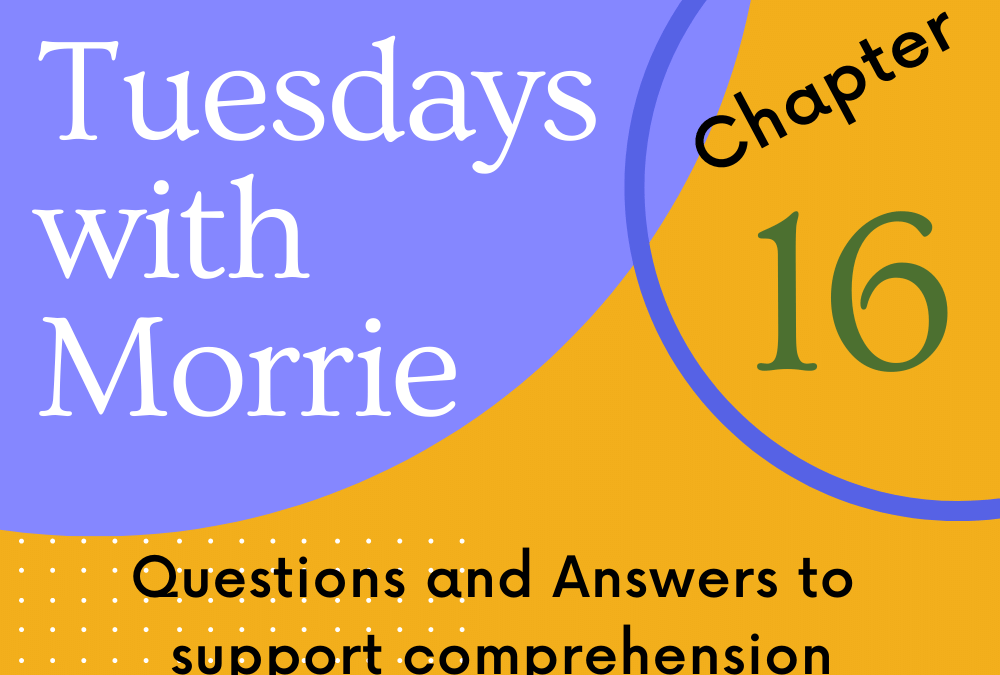| CHAPTER SIXTEEN – The Professor, Part Two. |
| 75 |
109 |
After finishing his PhD at The University of Chicago, he started working at ‘Chestnut Lodge’. What was this institution? |
Chestnut Lodge was a Mental Hospital. |
| 76 |
109 |
What was his job at Chestnut Lodge? |
Morrie had received a grant to observe the mental patients. |
| 77 |
110 |
One of the patients at Chestnut Lodge used to spend her days lying on the floor, being ignored by everyone around her. Morrie became saddened by her plight and so he started to try and interact with her. After sometime, Morrie discovered what the patient was really lacking. What did she really want and need? |
Morrie discovered that what the woman wanted was to be noticed by someone. |
| 78 |
111 |
Whilst working at Chestnut Lodge, Morrie learned many important lessons. One of these was about the value of money. What was this lesson? |
Morrie discovered that many of the patients were ultimately lonely and lacked human interaction and compassion. Many of them were also wealthy – this led Morrie to conclude that money could not make you happy. This was an important lesson that Morrie carried with him for ever more. |
| 79 |
111 |
Morrie started lecturing at Brandeis just before the 1960s. After he arrived, the political climate in the country led to the campus becoming a hotbed of radical and revolutionary ideas. Many of the most important radical figures to attend Brandeis at this time attended Morrie’s classes and those of the sociology department more generally. Why was this? |
Many of the most radical students attended Morrie’s classes and were involved with the sociology department because, unlike other faculties, the sociology department didn’t just teach theory but got practically involved in the issues and were, for example, fiercely antiwar. |
| 80 |
112 |
On one occasion, a group of black students occupied ‘Ford Hall’ on campus, draping a banner across the building which read ‘Malcolm X University’. Some members of the university were concerned that the students could be building bombs in the basement of the building but Morrie managed to diffuse the situation. How did he achieve this? |
Morrie managed to diffuse the situation when, by chance, he was invited into the building by a student who recognised him as a favourite member of the faculty as he walked past the occupied building. Sometime later, Morrie emerged with a list of grievances and demands from the students and presented these to the University authorities. As a result, the standoff was resolved peacefully and amicably. |
| CHAPTER SIXTEEN – The Seventh Tuesday We Talk About The Fear of Aging. |
| 81 |
115 |
By the ‘Seventh Tuesday’, Morrie was showing signs of rapid deterioration. He could no longer do anything other than breath and swallow. As he had prophesised earlier on the Nightline television show, he now had to have somebody else ‘wipe his ass’. How was Morrie able to deal with this? |
Morrie explained to Albom that it is only culture which is responsible for making people feel ashamed of being dependent upon others. Morrie ignored this, and instead he found it possible to enjoy his dependency again, like a child might. |
| 82 |
118 |
As their conversation continued, the pair began to discuss cultural fears of ageing. Whilst culture constantly told people that age, and signs of ageing, were undesirable, Morrie disagreed. Why was this? |
Morrie told Albom that he ‘embraced’ the ageing process. With age comes knowledge and experience, and Morrie believes that these two things are invaluable. |




